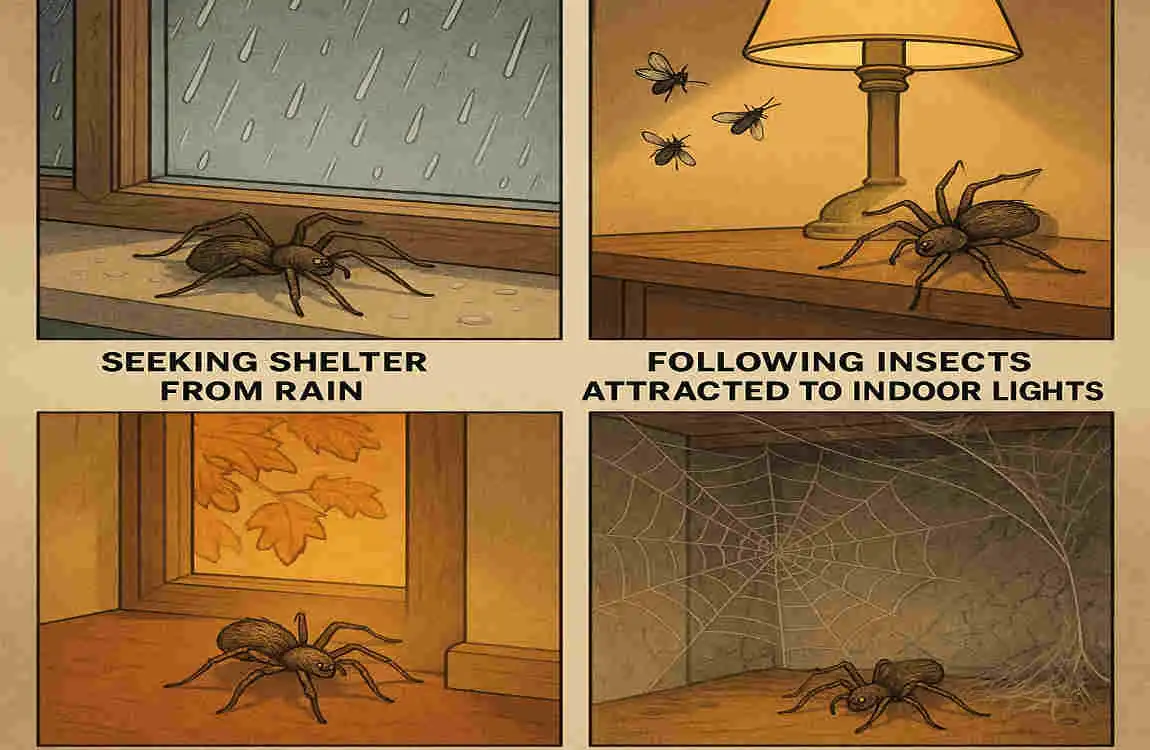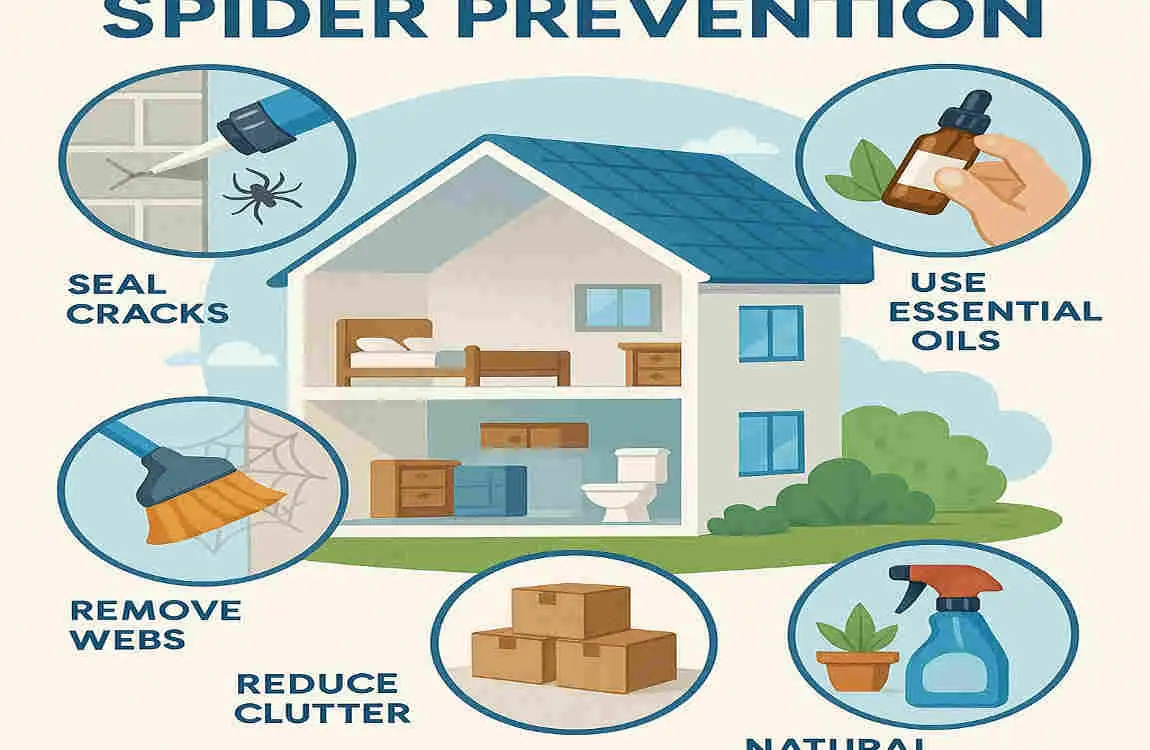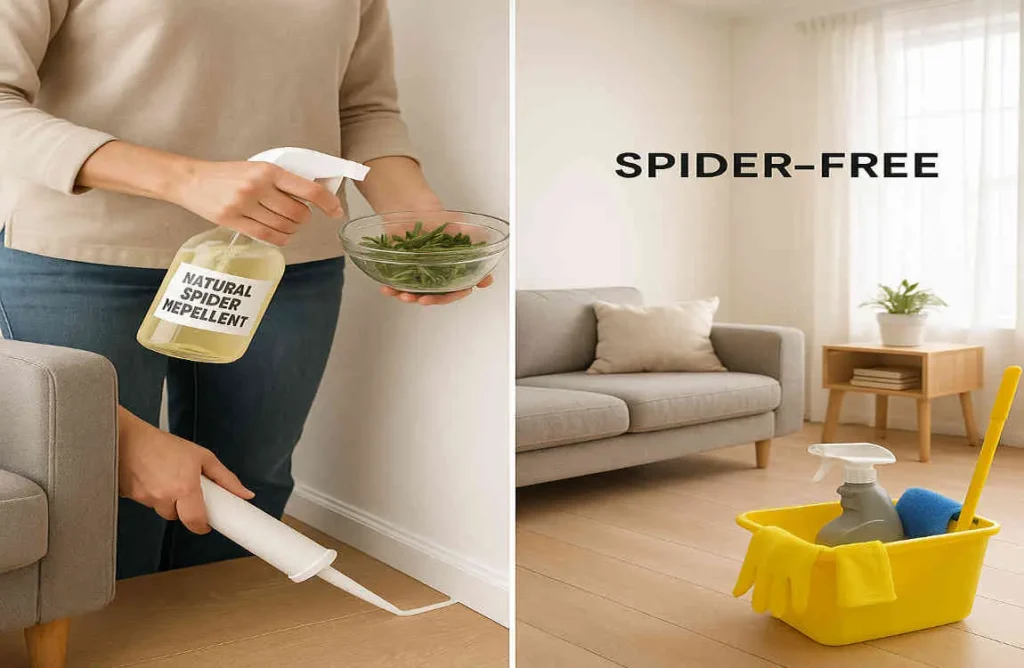Spiders are a common sight in many homes, often causing fear or discomfort for residents. While most spiders are harmless and even beneficial in controlling insect populations, it’s understandable to want to keep your living space free of these eight-legged creatures. To effectively manage spiders in your home clean, it’s crucial to understand the reasons behind their presence.
Why Do Spiders Come Inside The House?

Spiders are naturally drawn to certain conditions that our homes often provide. Here are some common reasons why spiders might venture indoors:
Searching for Food
Spiders are predators that feed on insects. If your home has an abundance of other bugs, such as flies, mosquitoes, or ants, spiders will be attracted to this readily available food source. By following their prey inside, spiders can find a consistent supply of meals.
Seeking Shelter and Warmth
Like any creature, spiders need protection from the elements. Your home’s walls, corners, and crevices provide ideal hiding spots that shield you from the cold, wind, and rain. Spiders may also seek out the warmth and humidity found in some regions of your house, such as basements, bathrooms, or attics.
Weather Changes and Seasonal Factors
Spiders often become more noticeable indoors during seasonal transitions. As temperatures drop in the fall, many spiders instinctively search for a warm place to overwinter. Similarly, heavy rains or extreme heat can drive spiders inside in search of a more hospitable environment.
Mating and Reproduction Habits
Some spider species, particularly males, may enter your home in search of a mate. After breeding, female spiders often seek out secluded areas to lay their eggs, which can lead to an increase in the spider population if left unchecked.
It’s important to note that different spider species have varying preferences for indoor habitats. Some, like cellar spiders and cobweb spiders, are well-adapted to living inside, while others may only venture indoors occasionally.
Common Types of Spiders Found Indoors
Several spider species are commonly found in homes. Here are a few you might encounter:
- Cellar Spiders: Also known as “daddy long-legs,” these spiders have small bodies and elongated, thin legs. They often build irregular, tangled webs in corners and ceilings.
- Cobweb Spiders: These spiders construct the classic, sheet-like cobwebs often associated with Halloween decorations. They are usually small and have rounded abdomens.
- Wolf Spiders: Larger and more robust, wolf spiders are fast runners that hunt down their prey. While they don’t build webs, they may wander into homes in search of prey, such as insects.
To identify a spider, pay attention to its size, shape, color, and the type of web it spins (if any). Most common house spiders are harmless, but it’s always best to exercise caution around spiders you cannot confidently identify.
Signs You Have Spiders in Your Home
Even if you don’t see spiders directly, several signs indicate their presence in your home:
- Webs: The most obvious sign is the presence of spider webs in corners, along baseboards, or in less-disturbed areas, such as attics and basements.
- Egg Sacs: Female spiders lay their eggs in silken sacs, which can be found attached to webs or hidden in secluded areas.
- Increased Insect Activity: If you notice a surge in other insects like flies or moths, this can attract spiders to your home as they follow their prey inside.
Spiders are most commonly found in quiet, undisturbed areas of your home, such as closets, storage rooms, or behind furniture. Regularly inspecting and cleaning these areas can help you detect and address spider activity early on.
Effective Preventive Measures to Keep Spiders Out

To keep spiders from entering your home in the first place, consider implementing these preventative measures:
Home Maintenance Tips
- Seal Entry Points: Use caulk to close off any gaps, cracks, or holes in your home’s exterior, paying special attention to areas around windows, doors, and utility lines.
- Repair Screens: Ensure that all your window and door screens are in good condition, free of tears or holes that could allow spiders to crawl through.
- Install Weather Stripping: Apply Weather stripping to the bottoms of doors to create a tight seal against the threshold, preventing spiders and other insects from slipping underneath.
Environmental Control
- Reduce Moisture: Spiders are attracted to damp environments. Fix any leaks, use a dehumidifier in humid areas, and ensure proper ventilation in bathrooms and kitchens to prevent moisture buildup.
- Manage Outdoor Lighting: Spiders are drawn to insects that congregate around outdoor lights. Use yellow bulbs or sodium vapor lights, which are less attractive to bugs, and keep lights away from doors and windows.
Landscaping Strategies
- Keep Vegetation Trimmed: Regularly prune shrubs and trees near your home’s foundation to minimize potential spider habitats.
- Avoid Stacking Wood: Woodpiles and other debris near your home can harbor spiders. Store firewood and similar materials away from the house.
By making your home’s exterior and surroundings less inviting to spiders, you can significantly reduce the likelihood of them entering your home.
Daily Cleaning Habits to Deter Spiders
Maintaining a clean home is one of the most effective ways to deter spiders. Here are some cleaning habits to adopt:
Vacuuming Strategically
Regularly vacuum floors, carpets, and upholstered furniture, paying extra attention to corners, baseboards, and other areas where spiders might hide. Use the vacuum’s attachments to reach ceiling corners and tight spaces.
Dusting and Surface Cleaning
Wipe down surfaces, window sills, and door frames to remove any spider webs or egg sacs. A microfiber duster or a damp cloth can effectively capture and remove these materials.
Clutter Reduction
Spiders thrive in cluttered environments, as they provide ample hiding spots. Keep your home tidy and organized, particularly in storage areas like closets, basements, and garages. Use airtight containers to store items and prevent spiders from making their homes inside.
Cleaning Task Frequency
Vacuuming floors and carpets Weekly
Dusting surfaces and corners Weekly
Decluttering and organizing Monthly
Deep cleaning storage areas Quarterly
By incorporating these cleaning habits into your regular routine, you can make your home less hospitable to spiders and other pests.
Natural and Chemical Spider Repellents
In addition to cleaning and home maintenance, you can use various repellents to keep spiders at bay:
Natural Repellents
- Essential Oils: Spiders dislike the scent of specific essential oils, such as peppermint, tea tree, and eucalyptus. Mix a few drops of these oils with water in a spray bottle and apply to areas where spiders might enter or hide.
- Vinegar: Fill a spray bottle with equal parts water and white vinegar, then spray along baseboards, window sills, and other potential entry points.
- Citrus Peels: Place fresh citrus peels (lemon, lime, or orange) in areas where you’ve noticed spider activity. The citrus scent acts as a natural deterrent.
Chemical Options
If natural repellents prove ineffective, you may need to resort to chemical sprays or pesticides. Always follow the manufacturer’s instructions and apply these products carefully, keeping them out of reach of food, children, and pets. Consider hiring a professional pest control service for severe infestations or if you’re unsure about handling chemicals yourself.
What to Do If You Find a Spider Inside
Even with preventative measures in place, you may still occasionally encounter a spider in your home. Here’s what to do:
Safe Removal Techniques
- Trapping: Use a glass or plastic container to gently trap the spider against a wall or floor. Slide a piece of paper underneath to secure the spider inside, then release it outdoors.
- Catch-and-Release: For larger or fast-moving spiders, use a long-handled broom or a designated spider catcher tool to safely capture and remove the spider without harming it.
If you’re unsure about handling a spider yourself or suspect it might be a dangerous species, contact a professional pest control service for assistance.
Importance of Long-Term Prevention
Remember that removing individual spiders is only a temporary solution. To keep your home spider-free in the long run, it’s crucial to maintain the preventative measures and cleaning habits discussed earlier. Consistency is key in making your home an unwelcoming environment for spiders.
How to Keep Your Home Clean and Healthy Beyond Spider Control
While focusing on spider prevention, it’s essential to take a holistic approach to home cleanliness and pest control:
- General Pest Prevention: Implement strategies to control other insects that might attract spiders, such as sealing entry points, storing food properly, and disposing of garbage regularly.
- Moisture Management: Keep your home dry and well-ventilated to discourage not only spiders but also moisture-loving pests, such as cockroaches and silverfish.
- Regular Inspections: Periodically inspect your home for signs of spider activity or other pest issues, particularly in less frequently used areas. Address any concerns promptly to prevent infestations from taking hold.
- Maintenance Schedule: Establish a regular home maintenance routine that includes tasks such as cleaning gutters, repairing cracks, and replacing worn Weather stripping to maintain a secure and pest-free environment.
By taking a comprehensive approach to home cleanliness and pest prevention, you can enjoy a healthier, more comfortable living space free from spiders and other unwanted intruders.
